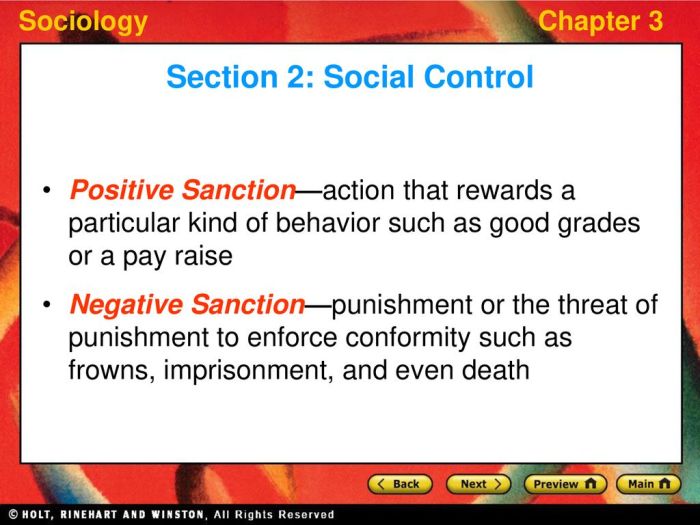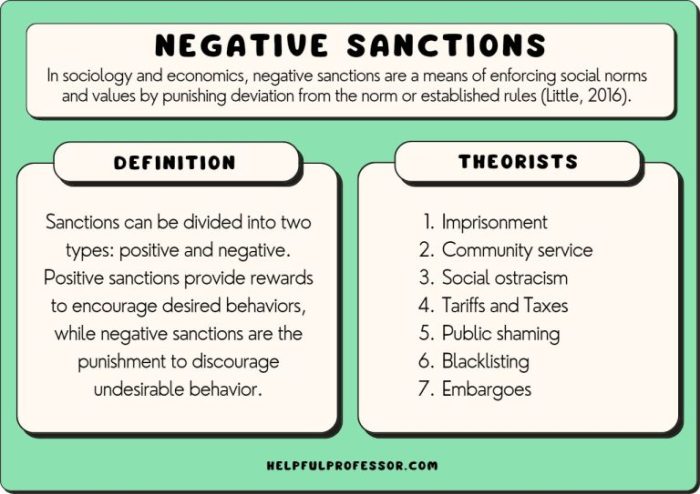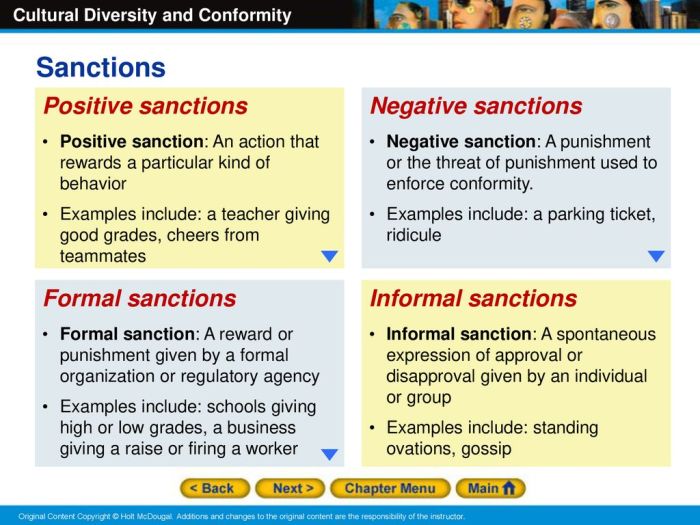Negative sanctions, a fundamental tool in shaping behavior, play a crucial role in regulating individual and group conduct. As a negative sanction rewards a particular kind of behavior., this comprehensive analysis delves into the intricacies of this behavioral modification technique, exploring its types, effects, ethical implications, and alternative approaches.
Negative sanctions are defined as consequences intended to discourage or eliminate undesirable behaviors. They encompass a range of measures, including punishments, penalties, and restrictions, varying in severity and duration. Paradoxically, negative sanctions can also be used to reward certain behaviors by removing or reducing undesirable ones, a principle known as “negative reinforcement.”
Negative Sanctions: Definition and Purpose

Negative sanctions are consequences imposed on individuals or groups to discourage or eliminate undesirable behaviors. They aim to modify behavior by creating a sense of discomfort or loss, thereby reducing the likelihood of the behavior being repeated.
Examples of negative sanctions include:
- Punishments: Physical or psychological consequences, such as fines, imprisonment, or demotion.
- Penalties: Monetary or non-monetary deductions, such as loss of privileges, suspension, or confiscation of property.
- Restrictions: Limitations on actions or activities, such as curfews, travel bans, or access restrictions.
Types of Negative Sanctions

Punishments
Punishments are the most severe type of negative sanction and involve physical or psychological discomfort. They are typically imposed for serious offenses and aim to deter future misconduct.
Penalties, A negative sanction rewards a particular kind of behavior.
Penalties are less severe than punishments and involve monetary or non-monetary deductions. They are often used to discourage minor offenses or violations of rules and regulations.
Restrictions
Restrictions are the least severe type of negative sanction and involve limiting actions or activities. They are typically imposed to prevent or control undesirable behavior.
Rewards for Specific Behaviors: A Negative Sanction Rewards A Particular Kind Of Behavior.
Negative sanctions can be used to reward certain behaviors by eliminating or reducing undesirable ones. For example, a child who misbehaves may be grounded, while a student who performs well in school may be allowed to stay up later.
In this way, negative sanctions can be used to shape behavior by creating a sense of discomfort or loss for undesirable behaviors and a sense of reward or privilege for desirable behaviors.
Effects on Behavior

Positive Outcomes
Negative sanctions can have positive outcomes on behavior, such as:
- Increased compliance: Individuals may be more likely to conform to rules and regulations to avoid negative consequences.
- Deterrence: Negative sanctions can deter individuals from engaging in undesirable behaviors.
Negative Outcomes
Negative sanctions can also have negative outcomes on behavior, such as:
- Resentment: Individuals may resent being punished or penalized, which can lead to further negative behavior.
- Avoidance: Individuals may avoid situations or activities where they fear negative sanctions, which can limit their opportunities and growth.
Expert Answers
What are the different types of negative sanctions?
Negative sanctions can be classified into three main types: punishments, penalties, and restrictions.
How can negative sanctions be used to reward behavior?
Negative sanctions can be used to reward behavior by eliminating or reducing undesirable behaviors. This is known as “negative reinforcement.”
What are the ethical considerations associated with using negative sanctions?
Ethical considerations include concerns about fairness, proportionality, and the potential for abuse.